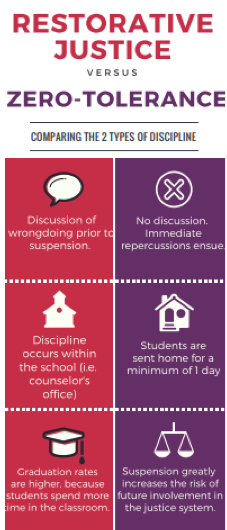Alternative methods of discipline keep kids in the classroom

October 28, 2016
It’s hard to believe that just 23 years ago, paddling kids was legal in Illinois schools.
Yet, for decades this was a standard of discipline in the American public school (it still is, in Texas!)
Suspensions and expulsions may seem just as old fashioned in the near future. Corporal punishment’s replacement, the zero tolerance policy, is on its way out as well.
Zero tolerance policies are a strict enforcement of consequences, which include suspension and expulsion for violations, regardless of the circumstances.
At ETHS, administration is experimenting with alternative discipline methods that include restorative justice, a system that emphasizes reconciliation and proactive programs.
“We are using tactics like peer conferences and brotherhood/sisterhood empowerment programs,” Cynthia Bumbry, lead dean at ETHS explained. “Brotherhood and sisterhood empowerment programs involve linking students with social workers to problem solve approaches to conflict.”
While zero tolerance policies aim to kick kids out of school, restorative justice aims to keep them learning, while focusing on ways to improve future behavior. So far, this approach seems to be working.
“Our alternative methods are effective in reducing suspension rates. We’re ahead of most schools in the country in terms of low rates of suspensions,” Bumbry said.
School policy experts agree that suspensions do not deter undesirable behavior at school. Students fall behind academically when they are suspended, and there are strong ties between low academic performance and disciplinary infractions. Moreover, minority youth are disproportionately suspended or expelled.
ETHS students agree that disciplining students by suspending them is disadvantageous.
“Most of the time when students are suspended, they just chill at home and do nothing, so they aren’t learning,” junior, Jade Johnson said. “It’s best to try to resolve the problem without suspending anyone.”
“It doesn’t really make sense to have harsh penalties of things without making an effort to try and rehabilitate,” sophomore, Eno Dynowski said. “It reminds me of a prison.”
According to a report by the Department of Education, in 2015, 95 percent of out-of-school suspensions were for slight infractions and misbehavior. Some students believe that punishment at ETHS reflects this statistic.
“From what I’ve seen in the lunchroom, ETHS hands out detentions pretty easily.” freshman, Adric Filerman said.
Although students and staff agree that there is room for improvement when it comes to the way that we handle misconduct, the future looks bright.
Adminstration at ETHS is trying something new, and is at the forefront of a national shift away from harsher disciplinary measures.
According to the American Federation of Teachers, “At least 19 states have passed legislation moving police and practice away from zero-tolerance strategies towards an increased emphasis on promoting positive school climates.”
From corporal punishment, to zero tolerance policies, to restorative justice, schools are constantly rethinking student discipline- and ETHS seems to be on the right track.







